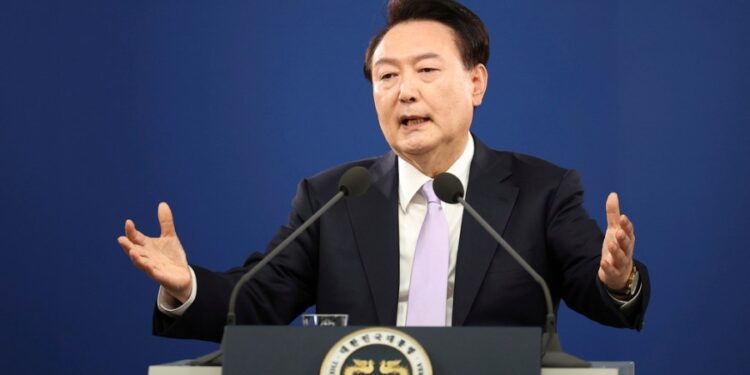
Late Tuesday, South Korean President Yoon Suk Yeol Yoon declared martial law, stating his intention to rebuild and protect democracy by eliminating two significant anti-government forces: opposition parties and pro-North Korean sympathizers. However, his declaration of martial law lasted only about six hours, as a bipartisan parliamentary vote swiftly rejected it.
All opposition parties, which hold the majority in Congress, have proposed an impeachment indictment against Yoon and plan to put it to a vote as soon as possible. They allege that the president’s declaration of martial law violated the people’s sovereignty and disrupted the separation of powers.
To pass the articles of impeachment, the opposition requires eight votes from the ruling party members who remain loyal to the president. Given the president’s political missteps, the opposition will likely find enough support to advance the impeachment articles to the Constitutional Court of Korea.
Once the Constitutional Court receives the impeachment case, it must decide within 180 days. However, due to ongoing political conflicts, the court is currently understaffed, with only six of the nine justices in place. A total of seven positive votes is needed to decide the impeachment case. Yoon believes he can evade impeachment by exploiting this staff shortage.
While the Constitutional Court is unable to render a judgment, Yoon will attempt to find a way to get away with his political folly. Lee Jae-myung, the leader of the largest opposition party, has already expressed concern that there is a possibility that “President Yoon, who failed to achieve martial law, will wage a local war.”
It is noteworthy that Lee Jae-myung predicted the president’s attempt to impose martial law three months ago, but at the time, he was ridiculed by the public, the ruling party and the secretary of Defense. Considering the opposition leader’s previous foresight, I share his concerns about the potential outbreak of a local war in the near future.
President Yoon will likely do whatever it takes to maintain his grip on power. He understands that once he steps down, both he and his scandal-ridden wife may face jail time. It is plausible that the embattled president could engineer a covert conflict to provoke North Korea, ultimately ordering an attack on Pyongyang in the name of self-defense.
President Yoon’s actions may resemble President Kennedy’s during the Bay of Pigs Invasion. At that time, the CIA disguised outdated World War II B-26 bombers to resemble Cuban air force planes. They purported to create a false alarm to rally American and Cuban support against Fidel Castro’s military buildup. However, President Kennedy did not achieve his objectives, which included overthrowing Castro and establishing a non-communist government friendly to the U.S.
President Yoon could paint drones to look like North Korea’s and fly into the Korean air defense zone in Seoul. He could order to shoot them down and launch a preemptive strike against Pyongyang by asserting that Seoul faces an imminent threat. This scenario is not unthinkable since the president has played hardball by insisting on preemptive strikes on the North ever since he was sworn into office.
I was puzzled when the U.S. security community suggested that North Korea might provoke Seoul shortly after President Yoon imposed martial law, leading to political chaos in the country. For instance, the Center for Strategic and International Studies noted, “Pyongyang is almost certain to exploit this turmoil for propaganda purposes against the Yoon government.”
This assessment seems misguided since North Korea did not engage in significant military provocations during South Korea’s previous martial law periods: in 1960 under civilian dictator Rhee Syng-man, in 1972 and 1979 under military dictator Park Chung-hee, and in 1980 under military dictator Chun Doo-hwan.
Currently, South Korea faces a significant internal threat: President Yoon. His desperate attempts to cling to power could potentially lead to a local war with North Korea. Observing leaders like Ukrainian President Volodymyr Zelensky and Israeli Prime Minister Benjamin Netanyahu, who have maintained their positions during wartime, Yoon may be tempted to prolong his time in office for similar political reasons.
Moreover, the U.S. cannot afford to engage in another conflict if tensions escalate in East Asia. The military is already stretched thin due to existing commitments in various global hotspots, including the Russo-Ukrainian war, the Israeli-Palestinian conflict and the Syrian civil war.
President Biden and President-elect Trump should collaborate to calm Yoon. A plausible solution would be to persuade Yoon to resign in exchange for a haven in Hawaii. When civilian dictator Rhee Syng-man caused significant turmoil, Dwight D. Eisenhower ordered the CIA to covertly assist Rhee in leaving South Korea and allowed him to live in exile in Honolulu until his death.
Exiling Yoon to Hawaii should occur before he makes another critical mistake that could lead to an irreversible conflict on the Korean peninsula, where the security interests of four major powers — the U.S., China, Russia and Japan — collide.
However, working with Yoon will be challenging for both Biden and Trump. This is because the South Korean president is not yet ready to accept that he is the least popular president in Korean history, and he has no viable escape from potential prison time if removed from office.
Seung-Whan Choi teaches Korean politics and International Relations at the University of Illinois at Chicago. A retired Army officer, he is the author of four books and 54 journal articles. His work has also appeared in popular media such as the Chicago Tribune, the Hill and the National Interest.







